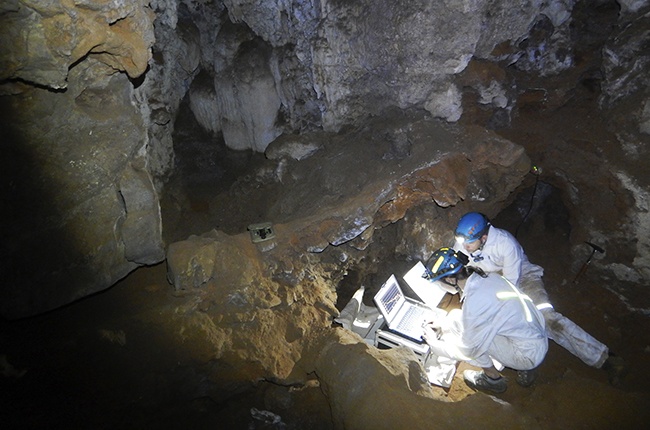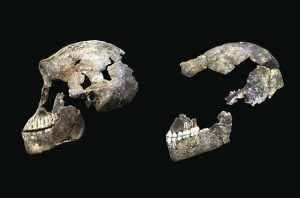Anthropology Researcher Makes List Of Discover Magazine Top Stories For 2017
A research team that included a Texas A&M University anthropologist who determined the fossil remains discovered last year in a South African cave almost certainly coexisted with early Homo sapiens has been named one of Discover magazine’s “Top 100 Stories for 2017.”

By Keith Randall
Texas A&M Marketing & Communications
Originally posted on Texas A&M Today.
A research team that included a Texas A&M University anthropologist who determined the fossil remains discovered last year in a South African cave almost certainly coexisted with early Homo sapiens has been named one of Discover magazine’s “Top 100 Stories for 2017.”
Darryl de Ruiter, professor of anthropology and Cornerstone Faculty Fellow in the College of Liberal Arts at Texas A&M, was part of a team of international researchers that made the discovery in a cave a few miles from Johannesburg of additional remains of Homo naledi, a new species of human relative that could reveal secrets about humankind’s origins. The most recently discovered skeletal remains included that of a child and an adult male.
The story was ranked No. 57 on Discover’s top 100 stories list.

”Neo” skull from Lesedi Chamber (left) with DH1 Homo naledi skull from Dinaledi Chamber (right). (Wits University/John Hawks)
A groundbreaking discovery
The findings marked the first time that it has been demonstrated that another species of hominin lived alongside the first humans in Africa, the team concluded.
“It means we can no longer be certain about precisely who created the archaeological record of the later Middle Pleistocene of Africa, the exact time period when our Homo sapiens was making its first appearance,” de Ruiter said at the time of the findings.
“The other groundbreaking discovery is that we have further proof that Homo nalediintentionally buried their dead and the bodies we found in the cave show that they were deliberately placed in the cave soon after death.
“Neanderthals and their ancestors – which go back about 400,000 years – and humans are the only species we know that intentionally buried their dead, so this cave adds another species to the list of relatives who participated in this most human of behaviors.”
The discovery and research was done by a large team of scientists from the University of Witwatersrand in South Africa and more than 30 additional universities and institutions.
Another important finding was that the age of the original Homo naledi remains found in the cave system has been revealed to be younger than previously believed and was lived between 335,000 to 236,000 years ago. It places these particular small-brained hominins at a time and place in which they likely lived alongside Homo sapiens.
The story of human evolution
Of making the list of Discover’s top 100 stories, de Ruiter notes, “It is very gratifying to see the public impact that our research is having. Paleoanthropology is the science of us all, and Homo naledi adds yet another chapter to the already fascinating story of human evolution.”
The ranking in Discover’s Top 100 stories is one of several that have included Texas A&M researchers in recent years. de Ruiter and his team previously made the list in 2010 with their announcement of the new species Australopithecus sediba, the same year that a news story about Texas A&M researchers examining the male pipefish that gives birth appeared, while in 2011 oceanography professor John Kessler and his work on the Deepwater Horizon oil spill was included in the top 100 rankings.
In 2013, the discovery of an enormous volcano in the Pacific Ocean that is named Tamu Massif after Texas A&M was ranked No. 11 by the magazine, and the first genome sequencing of the Ice Age skeletal remains of a 1-year-old boy by Texas A&M professor Mike Waters made the list in 2014. The findings proved that the direct ancestors of modern Native Americans were from Asia and not Europe as previously believed. And again in 2015, the team to which de Ruiter belongs made the original announcement of Homo naledi, reaching No. 2 in the rankings, behind the NASA flyby of Pluto.
Editor’s note: Due to an error on Discover Magazine’s website, the individual ranking is unavailable. Interested media may view the print edition of the ranking upon request.
###
Contact: Darryl de Ruiter at (979) 458-5986 or deruiter@tamu.edu or Keith Randall, News & Information Services, at (979) 845-4644 or keith-randall@tamu.edu
